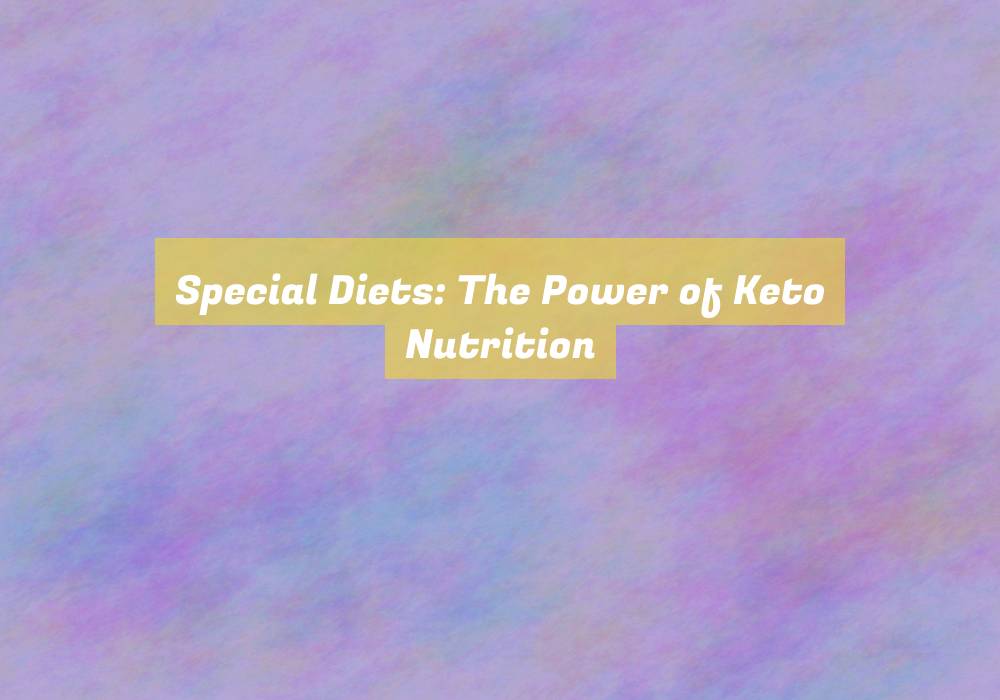Special Diets: The Power of Keto Nutrition
YouG??ve probably heard the saying, G??You are what you eat.G?? But have you ever considered the impact of your diet on your overall well-being? When it comes to special diets, the keto nutrition approach has been gaining attention for its potential health benefits.
But what exactly is keto, and how does it work? LetG??s explore the science behind this dietary strategy and uncover the power it holds for your health and wellness.
Understanding the Science Behind Keto
To truly understand the science behind keto, itG??s essential to grasp the metabolic process known as ketosis. When you consume a low-carb, high-fat diet, your body shifts from using glucose as its primary source of energy to using fat. This metabolic state is called ketosis. During ketosis, your liver breaks down fats into molecules called ketones, which become the main fuel for your body and brain. By understanding this process, you can appreciate why the keto diet focuses on drastically reducing carbohydrate intake. Without carbohydrates to convert into glucose, your body turns to fat for fuel, leading to weight loss and improved energy levels for many individuals.
Furthermore, comprehending the science behind ketosis helps you recognize the potential health benefits of the keto diet. Research suggests that ketosis may have therapeutic effects for conditions such as epilepsy, diabetes, and neurodegenerative diseases. Understanding the underlying mechanisms of how ketosis affects your body can empower you to make informed decisions about incorporating keto nutrition into your lifestyle.
Key Principles of a Keto Diet
Understanding the science behind ketosis lays the foundation for grasping the key principles of a keto diet.
The primary principle of a keto diet is to significantly reduce carbohydrate intake and replace it with healthy fats. This reduction in carbs forces your body into a metabolic state called ketosis, where it becomes incredibly efficient at burning fat for energy.
Another key principle is moderating protein intake. While protein is important for maintaining muscle mass and overall health, consuming too much can hinder ketosis by converting into glucose through a process called gluconeogenesis. Therefore, itG??s essential to strike a balance with protein consumption.
Additionally, a keto diet emphasizes the consumption of nutrient-dense, whole foods such as leafy greens, low-carb vegetables, nuts, seeds, and healthy fats like avocados and olive oil. These foods not only support ketosis but also provide essential vitamins and minerals.
Lastly, staying hydrated and replenishing electrolytes is crucial due to the diuretic effect of ketosis. Adequate water intake and electrolyte balance are vital components of a successful keto diet.
Health Benefits of Keto Nutrition
Embracing a keto nutrition approach can offer numerous health benefits, including weight management and improved energy levels. With the reduction of carbohydrates and the increase in healthy fats, the keto diet can help regulate blood sugar levels, making it a powerful tool for managing and preventing diabetes. Additionally, many individuals experience improved mental focus and cognitive function due to the increased production of ketones in the body. This can be particularly beneficial for individuals seeking enhanced mental clarity and concentration.
Furthermore, the keto diet has been shown to have positive effects on heart health by reducing risk factors such as high blood pressure, cholesterol levels, and triglycerides. Many people also report reduced inflammation and relief from conditions such as arthritis when following a keto nutrition plan. Moreover, the ketogenic diet has been linked to a reduction in epileptic seizures in some individuals, showcasing its potential therapeutic benefits beyond weight management.
ItG??s important to note that while the keto diet offers these health benefits, it may not be suitable for everyone. Consulting with a healthcare professional before making significant dietary changes is always advised.
Practical Tips for Starting Keto
Wondering how to get started with a keto diet? The first step is to educate yourself about the principles of the ketogenic diet. Focus on consuming high-fat, moderate-protein, and low-carbohydrate foods to induce a state of ketosis in your body.
Start by cleaning out your pantry and stocking up on keto-friendly foods such as avocados, olive oil, nuts, seeds, and fatty fish. ItG??s essential to plan your meals in advance, ensuring that they align with the macronutrient ratios of the keto diet. Meal prepping can be a game-changer, helping you stay on track and avoid temptation.
Another practical tip is to gradually reduce your carbohydrate intake, allowing your body to adjust to using fat as its primary fuel source. This can help minimize the potential side effects of the G??keto fluG?? as your body transitions into ketosis. Additionally, stay hydrated and prioritize electrolyte intake to support your body through this transition.
Tracking your food intake using apps or journals can provide valuable insights and help you stay within your daily macronutrient targets. Lastly, seek support from online communities or consider working with a healthcare professional or nutritionist to ensure that youG??re following the keto diet safely and effectively.
With these practical tips, you can confidently embark on your keto journey.
Conclusion
So, if youG??re ready to take control of your nutrition and experience the power of keto, remember to focus on high-fat, low-carb foods and stay consistent with your meal planning.
With the science-backed benefits and practical tips for starting keto, you can achieve your health and wellness goals.
Embrace the power of keto nutrition and watch as it transforms your life for the better.




